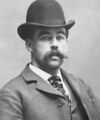Template:On This Day (nonfiction)/May 7: Difference between revisions
(Created page with "<gallery> ||1617: David Fabricius dies ... astronomer and theologian. Pic search dubious. File:Gerard_van_Swieten_Kaiserbild.jpg|link=Gerard van Swieten (nonfiction)|1700: Ph...") |
No edit summary |
||
| Line 86: | Line 86: | ||
</gallery> | </gallery> | ||
{{Template:Categories: May 7}} | |||
Latest revision as of 12:37, 5 May 2024
1700: Physician Gerard van Swieten born.
1794: French Revolution: Robespierre introduces the Cult of the Supreme Being in the National Convention as the new state religion of the French First Republic.
1832: Mathematician Carl Gottfried Neumann born. He will study physics with his father, and later work as a mathematician, dealing almost exclusively with problems arising from physics.
1860: Electrical engineer and inventor Oliver Blackburn Shallenberger born. He will invent the first successful alternating current electrical meter, which will be critical to the general acceptance of AC power.
1895: Russian physicist Alexander Stepanovich Popov demonstrates to the Russian Physical and Chemical Society his invention, the Popov lightning detector — a primitive radio receiver.
1895: First publication of The Time Machine by H. G. Wells.
1896: Serial killer H. H. Holmes is executed for the murder of his friend and accomplice Benjamin Pitezel.
1960: Cold War: U-2 Crisis of 1960: Soviet leader Nikita Khrushchev announces that his nation is holding American U-2 pilot Gary Powers.







